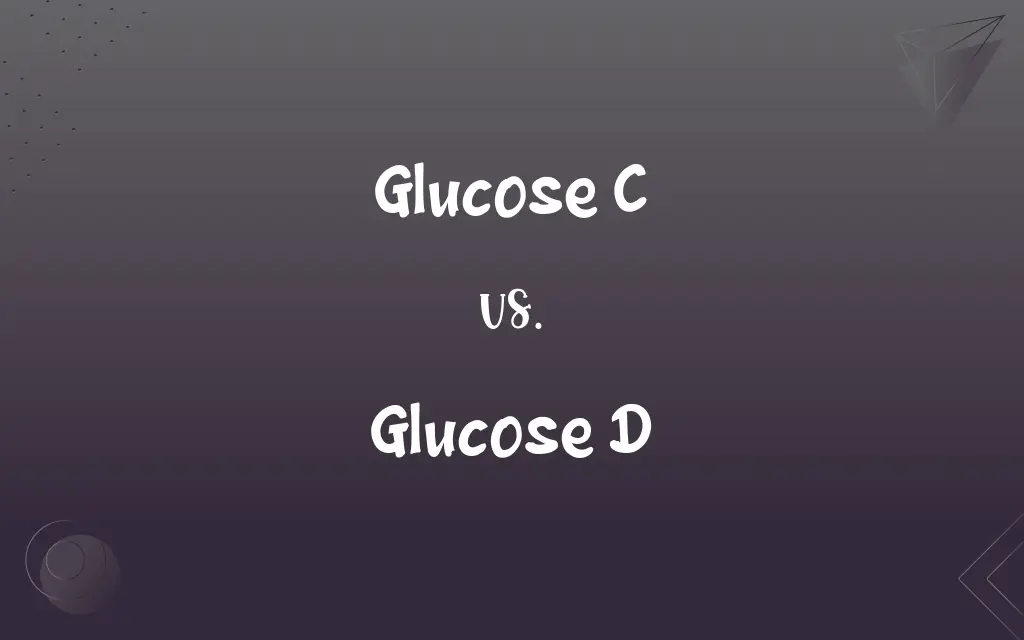Glucose C vs. Glucose D: What's the Difference?
Edited by Aimie Carlson || By Janet White || Published on December 15, 2023
Glucose C refers to a configuration of the glucose molecule, while Glucose D indicates another distinct configuration, each with unique spatial arrangements.

Key Differences
Glucose C and Glucose D differ primarily in their molecular configuration. Glucose C might represent a specific arrangement of atoms, possibly referring to a cyclic form of glucose. Conversely, Glucose D could indicate another distinct arrangement, potentially a different isomer or enantiomer in the glucose family.
In terms of chemical behavior, Glucose C could exhibit properties unique to its structure, like reactivity or solubility, which may differ from those of Glucose D. The specific molecular arrangement in Glucose D might render it suitable for certain biochemical reactions, distinguishing it from Glucose C.
Glucose C's role in biological systems might be distinct from that of Glucose D. For instance, Glucose C could be more prevalent in a particular metabolic pathway, while Glucose D might play a crucial role in a different biological process, reflecting their structural differences.
In terms of synthesis and derivation, Glucose C might be obtained or synthesized through specific methods that differ from those used for Glucose D. These methods could be influenced by the unique structural requirements and stability of each form.
The applications of Glucose C and Glucose D could vary. For example, Glucose C might be more effective in certain pharmaceutical formulations, while Glucose D could find more use in industrial applications, depending on their respective chemical and physical properties.
ADVERTISEMENT
Comparison Chart
Molecular Structure
Specific arrangement, possibly cyclic
Distinct arrangement, another isomer
Chemical Behavior
Unique reactivity or solubility
Different biochemical reactivity
Biological Role
Prevalent in certain metabolic pathways
Crucial in different biological processes
Synthesis Method
Specific synthesis methods
Different derivation methods
Applications
Suitable for certain pharmaceuticals
Used in different industrial applications
ADVERTISEMENT
Glucose C and Glucose D Definitions
Glucose C
Glucose C could be a specific form used in industrial applications.
The production process utilizes Glucose C due to its stability under these conditions.
Glucose D
Glucose D refers to a distinct structural variant of glucose.
Glucose D is more reactive in this type of chemical reaction.
Glucose C
Glucose C could denote a particular isomer of glucose.
Glucose C exhibits unique properties distinct from other glucose isomers.
Glucose D
Glucose D may be associated with specific biological roles.
Glucose D plays a vital role in energy production in these cells.
Glucose C
Glucose C refers to a specific structural form of glucose.
In this reaction, Glucose C is the primary reactant.
Glucose D
Glucose D could be a term for a glucose molecule used in pharmaceutical formulations.
This medication contains Glucose D for its effective delivery.
Glucose C
Glucose C may be a term for a glucose molecule with a certain atomic configuration.
Glucose C's configuration makes it essential in this metabolic pathway.
Glucose D
Glucose D might denote an enantiomer of glucose.
The enzyme specifically acts on Glucose D in this pathway.
Glucose C
Glucose C might represent a cyclic variant of glucose.
The conversion involves changing Glucose C into its open-chain form.
Glucose D
Glucose D could represent a glucose form with unique physical properties.
In these conditions, Glucose D remains more stable than other forms.
FAQs
Can Glucose C be converted into Glucose D?
Yes, under certain conditions, Glucose C can be converted into Glucose D.
Are Glucose C and D found naturally?
Yes, both forms can be found in nature, often in different biological contexts.
How does Glucose D differ from Glucose C?
Glucose D has a different molecular structure compared to Glucose C.
Is Glucose C more reactive than Glucose D?
Reactivity depends on their specific structures; one may be more reactive in certain conditions.
Can Glucose C and D interconvert?
Yes, they can interconvert under specific enzymatic or chemical conditions.
Are Glucose C and D involved in the same metabolic pathways?
They may be involved in different pathways due to their structural differences.
Do Glucose C and D have different solubility?
Their solubility can differ due to their distinct molecular structures.
Can both Glucose C and D be used in pharmaceuticals?
Yes, but their suitability depends on the specific requirements of the formulation.
What is Glucose C?
It's a specific form or configuration of the glucose molecule.
Which is more prevalent in the human body, Glucose C or D?
This depends on the specific metabolic processes and pathways in the body.
Are Glucose C and D used differently in industry?
Yes, their unique properties make them suitable for different industrial applications.
How are Glucose C and D synthesized?
They can be synthesized through different chemical processes, based on their structural needs.
Is Glucose D more stable than Glucose C?
Stability depends on environmental conditions and the specific form of each.
Are Glucose C and D's biological functions interchangeable?
Not always, as their functions can be dictated by their unique structures.
Do Glucose C and D have different effects on blood sugar?
Their effects can vary based on how they are metabolized in the body.
Can both Glucose C and D be derived from the same source?
Yes, they can be derived from common sources but require different processing.
Is Glucose C or D more important for human health?
Both can be important, depending on their roles in various biological processes.
Can Glucose C and D be differentiated easily in the lab?
Yes, through specific tests and analytical methods.
Do Glucose C and D have different roles in energy production?
Their roles can vary based on the specific energy production processes in organisms.
Are there any health risks associated with Glucose C or D?
This depends on the context of use and individual health conditions.
About Author
Written by
Janet WhiteJanet White has been an esteemed writer and blogger for Difference Wiki. Holding a Master's degree in Science and Medical Journalism from the prestigious Boston University, she has consistently demonstrated her expertise and passion for her field. When she's not immersed in her work, Janet relishes her time exercising, delving into a good book, and cherishing moments with friends and family.
Edited by
Aimie CarlsonAimie Carlson, holding a master's degree in English literature, is a fervent English language enthusiast. She lends her writing talents to Difference Wiki, a prominent website that specializes in comparisons, offering readers insightful analyses that both captivate and inform.






































































